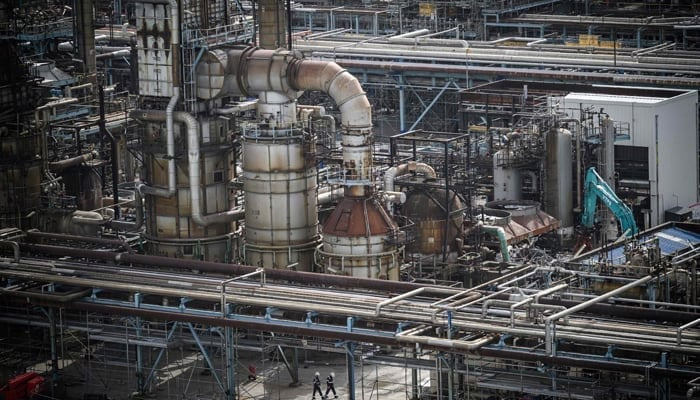Taxation dispute delays refinery upgrade deals under new policy
As deadline for signing of agreements will expire on Ja 16, 2024, both sides have to resolve issue of taxation escrow account
KARACHI: The refining sector is struggling to finalize agreements with the government for upgrading their facilities to produce cleaner fuels under a new policy, as a dispute over taxation remains unresolved, sources told The News on Monday.
As the deadline for the signing of agreements will expire on January 16, 2024, both sides have to resolve the issue of taxation escrow account. Under the policy, the release from the joint escrow account will be made on a pro rata basis, i.e. a maximum of 25 percent from the escrow account and 75 percent from the refinery’s own resources for the upgradation, and it will be audited by internationally reputed firms to ensure transparency and accountability.
However, Federal Board of Revenue (FBR) wants taxation on the release from escrow account, whereas the refining sector wants the government to consider it as a grant to avoid taxation. Industry offcials said any taxation on it would make it economically unfeasible for the refineries to go for upgradation.
Four refineries, Pak Arab Refinery Limited (PARCO), National Refinery Limited (NRL), Attock Refinery Limited (ATRL), and Cnergyico Limited, did not sign the agreements for their upgradation after raising issues over taxation, arbitration, force majeure, and import incentives, which they say are not in line with the announced policy. Only Pakistan Refinery Limited (PRL) signed the agreement in November last year. Cabinet Committee on Energy (CCoE) extended the deadline for signing of agreements by two months, which would expire on January 16, 2024.
The policy, which was notified on August 17, 2023, offered incentives and concessions to the existing refineries to invest in upgrading their facilities to produce Euro-V compliant fuels, which have lower sulfur content and are less harmful to the environment.
The policy required the refineries to sign an upgrade agreement with OGRA within three months, outlining their commitments, project milestones, and details. The policy was announced to attract $4-5 billion in investment in the refining sector, as the lack of investment in the refinery sector not only puts an additional burden on the foreign exchange reserves but also creates a significant dependency on imports.
The policy stated that a modern refining sector will not only boost the development of allied and downstream sectors of the economy but will also lead to industrial development, which is critical for economic growth. Furthermore, the modernization also benefits the end consumer, along with all the stakeholders, as productivity is optimized, and economic activity in nearby areas increases.
“We have been left with the taxation issue as other issues have been resolved. I hope that we will be able to resolve this issue in the next two to three days to move towards signing of upgradation agreements,” a top official of a local refinery said.
-
 Worst Cricket Moments That Shocked The Game
Worst Cricket Moments That Shocked The Game -
 Prince Harry, Meghan Markle Reach A Crossroads: ‘You Could Lose Everything’
Prince Harry, Meghan Markle Reach A Crossroads: ‘You Could Lose Everything’ -
 F1 Title Race: Who Will Win 2026 Drivers’ And Constructors’ Championships?
F1 Title Race: Who Will Win 2026 Drivers’ And Constructors’ Championships? -
 New Observatory Sends 800,000 Asteroid Alerts In One Night
New Observatory Sends 800,000 Asteroid Alerts In One Night -
 Cher’s Son Elijah Blue Allman Apprehended On Two Counts Of Assault At Elite Prep School
Cher’s Son Elijah Blue Allman Apprehended On Two Counts Of Assault At Elite Prep School -
 Beatrice, Eugenie Now Face Andrew, Sarah's ‘nightmares’: 'They're Hugely Conflicted'
Beatrice, Eugenie Now Face Andrew, Sarah's ‘nightmares’: 'They're Hugely Conflicted' -
 X Debuts Topic Filtering To Help Users Shape Their ‘For You’ Recommendations
X Debuts Topic Filtering To Help Users Shape Their ‘For You’ Recommendations -
 Scientists Built World's First Computer That Learns Like Human Brain
Scientists Built World's First Computer That Learns Like Human Brain -
 Robert Carradine’s Daughter Makes Bombshell Confession As Actor's Death Cause Confirmed
Robert Carradine’s Daughter Makes Bombshell Confession As Actor's Death Cause Confirmed -
 Beatrice, Eugenie Put On Blast: ‘Only Nitwits Wouldn’t See An Association With A Pedophile As Toxic’
Beatrice, Eugenie Put On Blast: ‘Only Nitwits Wouldn’t See An Association With A Pedophile As Toxic’ -
 OpenAI Defies Industry Pressure, Secures Guardrails Under New US Defense Department Pact
OpenAI Defies Industry Pressure, Secures Guardrails Under New US Defense Department Pact -
 'Sinners' Delroy Lindo Breaks Silence On BAFTA's Tourette’s Incident At NAACP Image Awards
'Sinners' Delroy Lindo Breaks Silence On BAFTA's Tourette’s Incident At NAACP Image Awards -
 Billy Joel Admits Cancelling Of Tour Due To Brain Disorder 'sounds A Lot Worse' Than It Is
Billy Joel Admits Cancelling Of Tour Due To Brain Disorder 'sounds A Lot Worse' Than It Is -
 US And Israeli Strikes On Iran: Everything You Need To Know
US And Israeli Strikes On Iran: Everything You Need To Know -
 US Strikes On Iran Ignite Emergency Push For Powers Legislation: Report
US Strikes On Iran Ignite Emergency Push For Powers Legislation: Report -
 Kelly Osbourne's Mom Sharon Receives 'shut Up' Call Accepting An Award For Late Hubby?
Kelly Osbourne's Mom Sharon Receives 'shut Up' Call Accepting An Award For Late Hubby?




